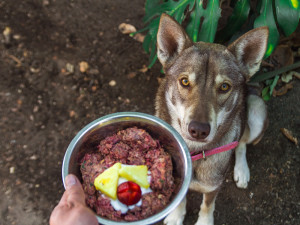Are GMO Foods Safe For Your Dog?
Holistic vet Robert Silver breaks it down.
Genetically modified organisms (GMOs) in human and dog food have been a controversial topic ever since they were introduced to the public in the 1990s. If your dog’s food contains corn or soy, there’s a good chance it’s been genetically modified. But is that a bad thing? Dr. Robert Silver, a holistic vet based in Boulder, Colorado, breaks it down.
Are GMO foods safe for your dog?
Silver initially tackled this issue in 2014 when he presented his paper, “Genetically Modified Food and Its Impact on Pet Healthopens in new tab,” at the American Holistic Veterinary Medical Association conference in Kansas City, Missouri. Why did he choose this controversial topic, one that few vets even acknowledge?
Dr. Silver — a pioneer in the field of holistic veterinary medical practice — says he was inspired by a seminar he attended on GMOs and human health. The speakers included Don Huber, a Purdue University professor, and activist Jeffrey Smith, who discussed problems, including reproductive difficulties, that have occurred in livestock fed GMO crops.
“I found this seminar mind-opening,” says Dr. Silver, the lone vet in attendance. “I had always believed the positive PR about GMO foods — that they are going to feed the world and are a good outcome of our genetic technology.”
How much do you spend on your pet per year?
The Food and Drug Administration, which regulates the safety of GMO crops consumed by humans and animals, considers most GMO plants “substantially equivalent” to traditional plants and “generally recognized as safe.” Their regulation involves a voluntary consultation process with the developer before products are brought to market.
Smith, founder of the Institute for Responsible Technology, a site devoted to educated the public about the dangers of GMOs, disagrees. He warns that “nearly all GMO crops are described as ‘pesticide plants.’ They either tolerate doses of weed killer, such as Roundup, or produce an insecticide called Bt-toxin. In both cases, the added toxin — weed killer or bug killer — is found inside the corn or soybeans we consume.”
Silver says that while “allergies, GI problems, increased risk of cancer, neurodegenerative conditions” and other ills could all be, in part, related to GMO foods, “there is no objective evidence of this yet” in dogs. “However, all vets will agree that there has been an uptick in [these diseases] in the past 10 to 20 years.” The advent of GMO foods in the 1990s “fits into this timing of disease increases,” he says.
His presentation referred to research that raises doubts about the safety of biotech crops, such as a studyopens in new tab reported in the New England Journal of Medicine, which found that genes inserted into crops can carry with them allergenic properties.
Problems with RoundUp
Silver says that genetic modification introduces foreign proteins that may encourage allergies, and the widely planted Bt corn, which makes its own insecticide, “could possibly cause leaky gut, the gateway to chronic disease.” Corn is a major component of most commercial pet foods. “The big problem with commercial foods is that they are manufactured at high temperatures and pressures,” which alters them and makes them “potentially more allergenic.” And commercial foods contain industrial ingredients that are “more likely to contain GMO and herbicide contaminants.”
Indeed, one studyopens in new tab found that GM crops engineered to withstand the toxic herbicide Roundup must now be doused with even more herbicide, since weeds have also developed resistance to it. Residues of these chemicals on crops can find their way into pet food.
Another studyopens in new tab published in the science journal Entropy showed that the heavy use of Roundup could be linked to Parkinson’s, autism, infertility, and cancers. It also found that residues of Roundup in food can interact with, and enhance, the damaging effects of other environmental toxins. “Negative impact on the body is insidious and manifests slowly over time as inflammation damages cellular systems throughout the body,” the study’s researchers say.
According to Silver, heightened sensitivity to dietary ingredients “is probably what we are seeing with GMO foods. It is of concern that this may be driving the increase in GI problems in pets.” Although gluten probably does account for some problems with grain consumption, “I think that grain-free diets, if they are also soy free and contain protein from animals not fed GM crops, can help many dogs, due to being GMO free — and not due to some allergy or gluten issue.”
The Bottom Line
As a holistic doctor, Silver believes food is medicine so he strongly recommends home meal preparation in order to avoid feeding GMO ingredients to your dog (especially if they have health issues). He notes: “I am truly a holistic practitioner in that I believe an ounce of prevention is worth a pound of cure.”
KEY EVENTS IN GMO HISTORY
1980: First GMO Patent Issued
A 1980 court case between a genetics engineer at General Electric and the U.S. Patent Office is settled by a 5-to-4 Supreme Court ruling, allowing for the first patent on a living organism.
1994: GMO Hits Grocery Stores
The U.S. Food and Drug Administration approves the Flavr Savr tomato for sale on grocery store shelves. The delayed ripening tomato has a longer shelf life than conventional tomatoes.
1997: Mandatory Labels
The European Union rules in favor of mandatory labeling on all GMO food products, including animal feed.
1999: GMO Food Crops Dominate
Over 100 million acres worldwide are planted with genetically engineered seeds. The marketplace begins embracing GMO technology at an alarming rate.
2014: GMO Patent Expires
Monsanto’s patent on the Roundup Ready line of genetically engineered seeds will end in two years. In 2009, Monsanto introduced Roundup 2 with a new patent set to make the first generation seed obsolete.







